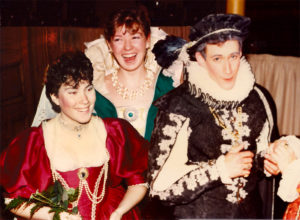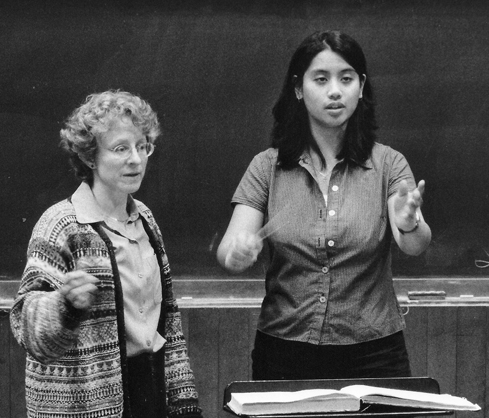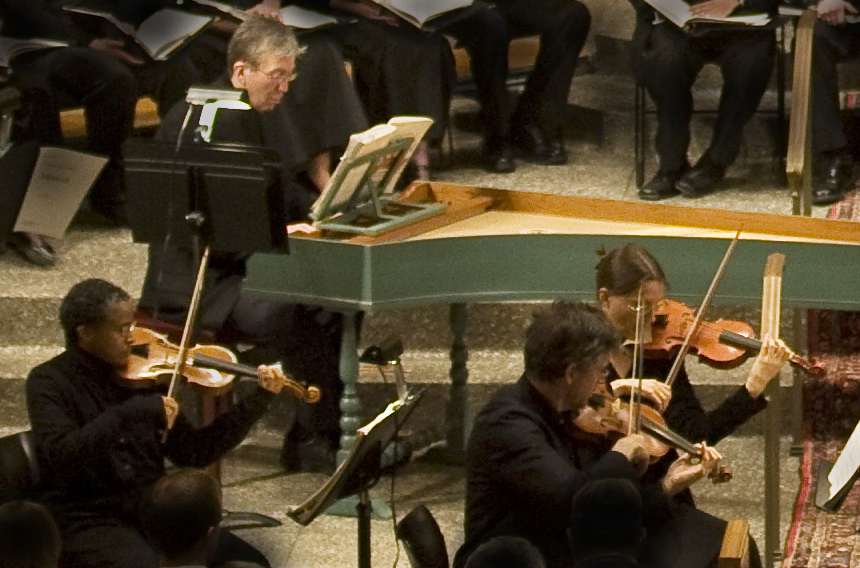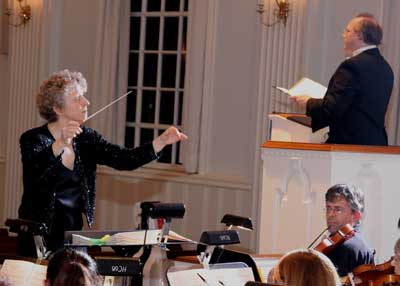INITIATIVES AT DARTMOUTH COLLEGE
In the Hopkins Center, I inaugurated two singing ensembles: the all-undergraduate Dartmouth College Chamber Singers and Concertato Singers, the community-student chamber ensemble of the Handel Society.
 Chamber Singers toured internationally seven times, an activity never previously engaged in by a Dartmouth music ensemble. We were joined by the Early Music Ensemble, an ensemble I started with lutenist James Dowcett, to present the renowned annual Feast of Songs, a series of costumed, theatrical, and musical dinners. In later years Chamber Singers performed our vocal-instrumental concerts with the Arcadia Players, a professional period instrument ensemble.
Chamber Singers toured internationally seven times, an activity never previously engaged in by a Dartmouth music ensemble. We were joined by the Early Music Ensemble, an ensemble I started with lutenist James Dowcett, to present the renowned annual Feast of Songs, a series of costumed, theatrical, and musical dinners. In later years Chamber Singers performed our vocal-instrumental concerts with the Arcadia Players, a professional period instrument ensemble.
Concertato Singers participated in Handel Society mainstage concerts on occasion but primarily served as the organization’s community emissary. We gave concerts in smaller venues in the region and collaborated with other groups such as the Vermont Symphony Orchestra and New Hampshire Music Festival. Vox, composed by Dennis Desormier ’97, was commissioned for the ensemble to sing at the dedication of the new stained-glass window in Acquinas House.
Interested in the pedagogy of conducting, in 1988 I obtained grants for, founded, and directed the Dartmouth Conducting Institute (1988-1990), a professional workshop for ten auditioned conductors. I taught alongside guest faculty Jan Harrington and Thomas Dunn. Repertoire included selected Bach cantatas and Handel anthems (1988); Mozart Requiem (1989); and Brahms Requiem and Berlioz L’enfance du Christ (1990).
COURSES
Music Foreign Study Program
I founded, designed, and directed the Music Department’s term-long study program in London (originally offered in alternate years) and lead it four times (1986, 1988, 1999, 2002). Within it I created and taught Perspectives in Music Performance during which students researched, gave presentations, and discussed music heard live in London. Continuing today, students in the program take courses on the history of music in England and private lessons on their instrument. Masterclasses, recitals, and day trips to workshops, concerts, and museums are incorporated into the schedule. Presently the music department offers the program every year, alternating between London and Vienna.
Brahms, Berlioz and the Romantic Imagination
This course focused on the music, writing, and lives of two pivotal composer-conductors at the apex of 19th-century romanticism in Western Europe: Johannes Brahms (1833-1897, Germany) and Hector Berlioz (1803-1869, France). Origins of romanticism, musical influences, genres and compositional styles, performance practices, and conducting careers were explored. Course work included listening, viewing, reading and critical writing assignments. No prerequisite or music background was necessary. Teaching this course was a wonderful preparation for writing Experiencing Berlioz: A Listener’s Companion, and I’m so grateful to the students for their many insights.
Conducting
 In my second year at Dartmouth, the faculty invited me to design a conducting course. I particularly relished the opportunity and have adapted the course over time. This course provides a philosophical basis and practical introduction to the art of conducting music. Score preparation (melodic, harmonic and form analysis; transposing instruments and clefs proficiency), historical styles and performance practices, baton technique, and rehearsal procedures are studied and applied. Instrumental and vocal music are incorporated into in-class daily assignments and a vocal midterm project is rehearsed outside of class with an ad hoc ensemble. Every week each student conductor receives a 20-minute individual appointment for score reading and mid-term and final project preparation. For the final project, students conduct orchestral excerpts played by two professional pianists (four-hand reductions) in class followed by conducting the same selection with a professional-student orchestra in a special session.
In my second year at Dartmouth, the faculty invited me to design a conducting course. I particularly relished the opportunity and have adapted the course over time. This course provides a philosophical basis and practical introduction to the art of conducting music. Score preparation (melodic, harmonic and form analysis; transposing instruments and clefs proficiency), historical styles and performance practices, baton technique, and rehearsal procedures are studied and applied. Instrumental and vocal music are incorporated into in-class daily assignments and a vocal midterm project is rehearsed outside of class with an ad hoc ensemble. Every week each student conductor receives a 20-minute individual appointment for score reading and mid-term and final project preparation. For the final project, students conduct orchestral excerpts played by two professional pianists (four-hand reductions) in class followed by conducting the same selection with a professional-student orchestra in a special session.
* * *
In addition to creating these courses and teaching others—Introduction to Music Theory for non-majors, Voice and Text (freshman seminar), Vocal and Vocal-Instrumental Repertoire (for performers), and a music appreciation course—I was an advisor to numerous individual students working on honors theses, recitals, senior fellowships, and presidential scholar projects.
CREATING INDEPENDENT ENSEMBLES

I view the founding in 2004 of the Handel Choir’s Handel Period Instrument Orchestra, in collaboration of concertmaster and contractor Christof Richter, as one of the most important contributions I made to choral music in Baltimore. When period instruments perform the repertoire of their time and all concerned are engaged in discovering the different balances, articulations, textures and colors, the experience is revelatory.
* * *
In 2003, Steven Morris and I created Boston Vocal Artists’ Sonique, a 9-10 voice professional vocal ensemble. The inaugural concert, Bon Anniversaire, Berlioz!, was in honor of composer’s birth bicentennial. We performed little-known choruses and solos by this remarkable French composer along with solo and ensemble repertoire by Poulenc, Milhaud, Duparc and Saint-Saëns. The treasure trove of repertory prompted a truly gratifying journey from planning to performance.
In 2004, we approached the astonishing chamber music repertoire of well-known American and British 20th-century composers. Music included Samuel Barber’s Reincarnations, William Schuman’s Carols of Death, and Britten’s Five Flower Songs. Solo and small ensemble music included works by Charles Ives, Aaron Copland, Roger Quilter, Peter Warlock and of special note, Britten’s Canticle IV: Journey of the Magi.
Our 2005 season explored new music by composers that Steven Morris and I knew personally. The program included the world première of a commissioned work by Christian Wolff, Wake up!, and new works by Charles Dodge, John McDonald and Ileana Perez Velazquez. We also explored music related to folksong and mythology such as Britten’s Irish folk song arrangements, Ravel’s Cinq Mélodies populaires grecques (Five Greek Folk Songs), Ralph Vaughan William’s Orpheus with His Lute, Ganymede by Franz Schubert, and Brahms robust Zigeunerlieder.
* * *
 In 2000, I founded and conducted the professional twelve-voice Groupe Vocale de St. Denis (Hanover, NH). We performed a varied repertoire for evensong services and commissioned Musica Dei Optimum by Dartmouth music faculty member Charles Dodge. Singing a cappella motets by Palestrina and Duruflé from the small rear balcony of St. Denis Church—music composed for just such a space—brought on transcendent moments for listeners and singers alike.
In 2000, I founded and conducted the professional twelve-voice Groupe Vocale de St. Denis (Hanover, NH). We performed a varied repertoire for evensong services and commissioned Musica Dei Optimum by Dartmouth music faculty member Charles Dodge. Singing a cappella motets by Palestrina and Duruflé from the small rear balcony of St. Denis Church—music composed for just such a space—brought on transcendent moments for listeners and singers alike.
* * *
In 1984. James Bolle, music director of the New Hampshire Symphony Orchestra based in Manchester, asked me to start the New Hampshire Symphony Chorus. The organization grew from performing Beethoven’s Ninth Symphony in the Palace Theater to presenting the Verdi Requiem, Busoni Piano Concerto No. 2 (men’s chorus), and Berlioz Grande messe des morts in the magnificent St. Marie’s Church; all concerts were conducted by James Bolle. The experience of being a chorus master was incredibly rewarding, for it gave me new and invaluable perspective on the discipline required to prepare singers for another conductor.